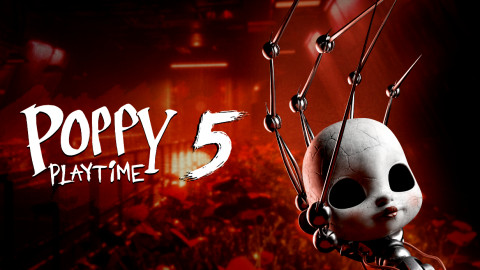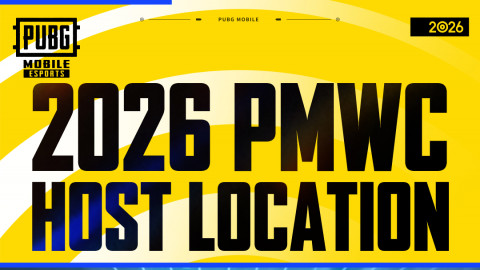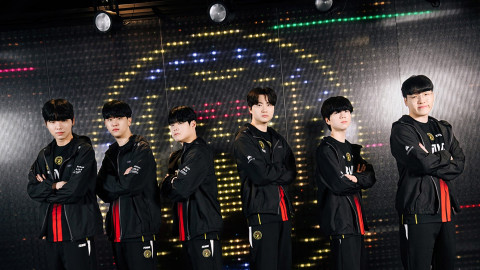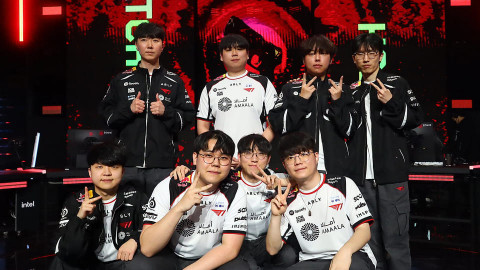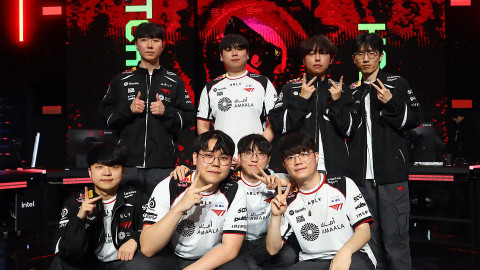
Esports stars come and go with the years. If you compare a list the most popular and respected Hearthstone players from 2015 with one from now, the vast majority will be different. But one name will prominently appear: Jon "Orange" Westberg. Naturally, the Swedish veteran has had his competitive ups and downs. But however hard faith may have tried, Orange wouldn't let go of Hearthstone. And maybe Hearthstone wouldn't let go of Orange either. Through sheer resilience and determination he always managed to bounce back, which has led to him being one of the most respected professionals in the field, as well as a position at the prestigious SK Telecom T1.
This year Orange entered Hearthstone Grandmasters, a league-based Hearthstone system with 16 players per region participating. While Season 1 went well, Season 2 might just have a grim end for Orange: he's on the brink of relegation.
We had a long chat with the seasoned cardslinger on the eve of one of the most important weekends in his career. He shed light on what it was like to enter a brand new competitive format and the hours of practice it requires to stay afloat when you're competing with the world's best. Orange also spoke with candor about the changes that have been made to Grandmasters thus far, and what changes he would like to see in the future.
I want to talk with you about your whole Grandmasters experience, since the first year of the format is drawing to a close. Let's start at Season 1: What was it like to compete in such a league format?
"It went well. I was pretty nervous going into Season 1 considering that we were going to play a brand new format. The whole Grandmasters experience was completely new to all of us. There were a lot of things to adapt to. At first glance the format actually seemed like the biggest new thing, but looking back at it, I think playing against the best players all the time was pretty big as well. It has been tough, but it's also been a lot of fun. I play Hearthstone so I can play against the best of the best, right? I've really enjoyed the Grandmasters experience in Season 1.
The season was also different in the sense that you didn't really have anything to lose like you have in most other tournaments. I mean, I made it to the Playoffs, but there was never really too much pressure going into Season 1, which made it feel vastly different from Season 2."
"If you're looking to compete against really, really good players, Grandmasters
is the best experience we've had so far in Hearthstone."
We'll get to Season 2 a bit later. You mentioned you play Hearthstone to play against the best of the best. Especially at the start of Grandmasters people were debating whether or not all players, invited by Blizzard, were truly the best competitive Hearthstone had to offer. What's your take on this now?
"Well, what I meant with 'competing against the best' is not that we are 100% for sure the best sixteen players in Europe. I don't really mean to say that. What I mean is, if you're looking to compete against really, really good players, Grandmasters is the best experience we've had so far in Hearthstone. I think, for Europe at least, they [Blizzard] did a pretty good job of inviting sixteen of the best players. I don't want to call names obviously, but there some people in Grandmasters of which I think they might not be among Europe's sixteen best. There are definitely people outside of Grandmasters who make me think: "Damn, I wish they were in," because they would be good representatives of the game."
So generally speaking, you think the density of competition is about as good as you can get?
"Yes, absolutely. Every single week I think "Oh god, my opponents are very good at the game." But it's always a lot of fun to prepare for them and see what they're up to. I had my doubts about Grandmasters in the beginning. There are a lot of things about it which I don't think are perfect, but the actual experience of playing in it is very fun, very enjoyable."
You said that there was not as much pressure in Season 1, which makes sense because the risk of relegation didn't exist. However, there was still a ticket to BlizzCon on the line which must have added pressure, right?
"It wasn't the same kind of pressure. My goal for sure was to get into the Global Finals, play there and win there like every year. There just wasn't the "if you lose, you're losing a lot" kind of pressure.
Season 1 went well though. It took some time to get used to the format, but that was the same for everyone. I think I did a pretty good job. For this year, in Grandmasters, we built a monstrosity of a playtest group with Hunterace, BoarControl, Feno, Justsaiyan and Muzzy. Having that group of people around to help you with learning a new format... that's been pretty great. We did a pretty good job—at least most of us in Europe had amazing results, with Feno going to Worlds, me and Casper [Hunterace] both being in the semi finals. BoarControl had a bit of a rough season, and so did Justsaiyan and Muzzy.
Overall we were very happy with our performances. I personally was happy too not to be the only one to get to the semi finals. I'm still kicking myself over some of the plays I made in that semi finals against Feno. It was pretty uncharacteristic. I'm not sure if that was because of the nerves, but I made some mistakes and it cost me. That's how it should be in Hearthstone though, I'm happy whenever the better player wins."
"We would get in a call, sometimes for, like, ten hours to talk
about stuff and test things together."
What would your training schedule look like during Season 1, when there was a relative low amount of pressure and there was "nothing to lose"?
"When there was nothing on the line my training schedule was: From Monday to Wednesday, we would non stop try different ideas that we'd been testing. If anyone had brought anything different, we tried that out and tested those matchups to see if those changes were good and impacted anything. We tried different sideboards, we tried redefining decks etc. On Wednesday night we gathered all six of us and talked things over to see if anyone had found something with potential. We would get in a call, sometimes for, like, ten hours to talk about stuff and test things together. We would try to convince the others about what we've found, or share shortcomings in strategies we had discovered.
Then for deck submission, which is on Thursday morning, everyone settles on different things. In Season 1 Feno loved Mage, I loved Rogue, and we weren't going to convince each other to switch decks."
How many hours, on average, would you say you practiced?
"I would say that for the last few weeks in Season 1, including Playoffs, I was probably playing about five to six hours per day from Monday to Wednesday. But the real testing is after the decklists are submitted and you can see what your opponent is bringing. So you see that on Thursday, practice against that, and [depending on the schedule] you have either Friday, Saturday or Sunday off. If you have a Friday or Saturday off, you have that entire day to practice as well. I spent the entire day up until my matches practicing as well. Say, if I play against [Hunterace] at 6 pm, then I'll test from about 9 am until 3 pm, and take a short break before the match."

Season 1 also introduced the larger audience to Specialist. How do you look back on that?
"I think the Specialist format was actually worse than people think it was. I could not imagine a better meta for Specialist than the time during which we were playing with it. It made Specialist look like it had diversity. But if we would have Specialist, that's when you would really start seeing it crack and see how bad it really is. Priest with a side deck, or counter Priest... It would be a lot of very coinflippy matches. Possibility number 1 is that Priest would be the best deck, and no one could beat Priest so we all would play mirrors all day every day. The other scenario is that Priest is the best deck, but it would have a counter deck, which of itself has a counter deck etc. It would have decided the series before we even started playing the game. So we got out at the right time!"
"I think the Specialist format was actually worse than people think it was."
Let's move on to Season 2, which brought with it important changes. Specialist was finally dropped, and Grandmasters adopted the 'Shielded Conquest' format. How was that format crafted?
"It was suggested by one of the Grandmasters. The Hearthstone Esports team invited us, saying they were looking at formats that weren't Specialist. They set up a meeting with me and a few others, which is where the format was brought up. During the call we started to work on it together, explore what you could do with it and how it would play out. Most of us in the call, me included, liked the idea a lot, I thought this format sounded amazing. A bit later [Blizzard] were like: "Let's run some practice tournaments to see if it plays out alright." Sadly the turnout for these tournaments wasn't ideal. It wasn't like all 48 Grandmasters signed up for them. Still, we got a pretty good feel for it I think, and I felt comfortable with the format.
I was very happy to see it all. It meant that they took feedback from us. A lot of the time you get the feeling, as a community, that [Blizzard] hears your feedback and then nothing really happens. But this was a very clear case of "we hear what you're saying, and we're implementing it because it sounds good." It showed me that they're not scared to listen if someone says something smart."
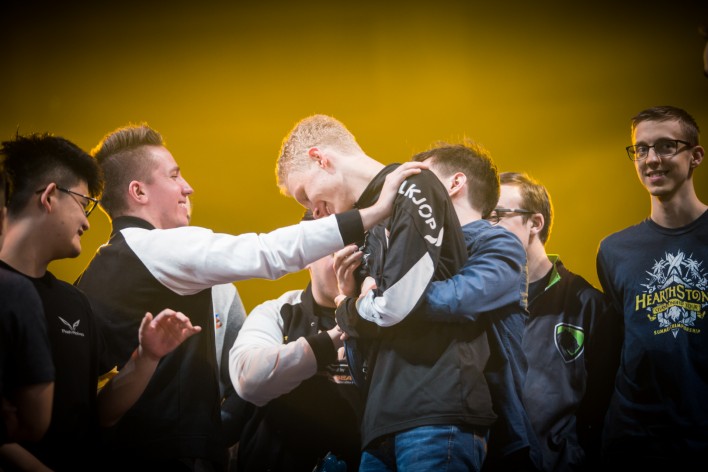
You've played with the format more now, did it turn out as well as you think it would?
"I've been saying, jokingly, that either this format is insanely complicated and that no one is even close to figuring it out that, OR it's just dumb. [Laughs] That's not very fair to the format. I actually still like the format. It has a lot of depth to it. In the beginning we were comparing spreadsheets with percentages of shields and bans, it is a little bit like chess. But sometimes during calls it would take an hour to figure out what you're supposed to shield; it's never really straightforward. It gets pretty complicated based on every move your opponent can make, and you have to take into account what they think of matchups. If they think about a matchup differently than you do, they could end up choosing something completely different from what you thought and that can screw you over.
But I think it's a good thing that this format won't be played at the Masters Tours. If you really understand the depth of the format, I think, it's very, very overwhelming. It could just be more healthy to have regular Conquest. But for Grandmasters I enjoy figuring it all out. It's very satisfying when you get things right."
"Even if you've played the most popular matchups a lot... every single tech card creates a huge difference in how a certain match plays out."
In Season 2 there's a lot more on the line than a ticket to BlizzCon: you can get relegated and lose your Grandmasters title. At the start of the season, did that add more pressure?
"I don't think I added too many more hours, maybe a few. It's not because of the relegation part, it's more of a format thing. In Specialist you only had to learn two matchups. I needed to learn my Primary deck versus their Primary deck and I had to learn the side decks I would use, which was easy to figure out. In the multi-deck format there is a large number of matchups that can be played in any given format. As I said, you can try to figure out their picks and bans and if you think you nail that, you can practice those matchups. But if you only practice those and your opponent throws you a curveball—which they might do intentionally or because they think differently—then you're left with an unpracticed matchup.
If you want to be prepared for a series you have to prepare every possible matchup for that series. And it takes a lot of games to learn a matchup. Even if you've played the most popular matchups a lot... every single tech card creates a huge difference in how a certain match plays out."
This season did not go as well as Season 1. You're actually in the danger zone, and might be relegated. When did you start to feel this?
"It's been a rollercoaster of a season to say the least. I started with a pretty mediocre 1-1 in the first week, and then went 0-2 in the second. I remembered when I played my fourth match, against Thijs, I was down in game 1. I never get super anxious whenever I play, these days. Even though it might sometimes look like it on camera, I'm not really anxious. But in the break between game 2 and 3, I started to think "1-4... that is a very, very, very bad start to a season." That's when I got my first real taste of the mental pressure. I got stressed out, but I managed to turn that match around. I went on a 4-0 match streak after that, and I was feeling pretty good at 5-3.
I had the Battleriff finals that week. I did well in that tournament, I got second, but sadly I didn't have as much time to practice for my Grandmasters games. It was fine, because I had a lineup prepared already and I did end up submitting the same, but it left me super predictable. I went 0-2. I'm on an 0-4 losing streak now. I've had a few rough breaks. I haven't played flawlessly, there have been a few mistakes. I would say that I still played up to my standards, but people sometimes make small mistakes and they don't end up mattering.
I think mostly my deck choices have been subpar, and on top of that I've been ultra punished for every single play I made in these series. Sometimes they were mistakes, sometimes they were 50/50 lines where in hindsight the other line would've worked out. On top of that, the other matches around me have been going very, very poorly. So now we're stuck in a weird situation in our division. There's the risk that I'll be relegated with six wins."
We actually have an article discussing each division's relegation candidates, and your division is the most complex indeed.
"Yeah so in the event we have a tie of people with 6 wins, I have by far the worst tiebreakers. Even though now it looks like I'm ahead, should Viper win twice his tiebreakers are much better than mine. The problem is [Hunterace], actually, because he won against everyone in the top half of the standings, but he lost against the people in the bottom half. Except for me. That has boosted the tiebreakers of all the other players in the bottom half. My tiebreakers are super dumpster."
"My entire career could hang on my match tomorrow, and that has messed
with me a lot throughout the week."
It can be simple. If you win against Viper, you're safe.
"Yes, straight up safe. My entire career could hang on my match tomorrow, and that has messed with me a lot throughout the week. If I win against Viper I'm safe. Good. If I lose against Viper and I win against Rdu, I need either Viper to not 2-0, I need Radu to lose his other match or I need Swidz to 0-2. If either of those happen, I'm safe. But otherwise I'm still out.
Knowing that if I 0-2 this week, that it would be the end of me [in Grandmasters]... you can't really sugarcoat it. I mean, I would try to... hang around and work on my stream while trying to spike a Masters Tour for a year, but…"
Yes? What if you get relegated?
"I... I'm not super comfortable talking about that when I've got this important match tomorrow. I don't think it's going to be good for my nerves. Of course it has crossed my mind. But it would be very self-destructive to constantly think about it, and about what I would do."
Let's take a different approach then. The Grandmasters system, as it is now, is pretty exclusive and few people can make it in. How would you improve this? Would you have more Grandmasters, a smoother relegation/promotion system, maybe something else?
"A lot of us in Grandmasters have been pushing towards some division below Grandmasters. It doesn't necessarily have to be a division, but more some space the players can go to between qualifications for Masters Tours events and the actual Masters Tour itself. After you qualify for your Masters Tour you don't really have much to do. Ladder is not super relevant anymore then, though an improvement that has been made is that Ladder can qualify you for Masters Tours. But people want a reason to play Hearthstone for several hours a day. People like Hearthstone, but they need some incentive to play it.
I've been talking to [Blizzard] and I've been telling them to give people an incentive to play the game. That's really all people are asking for. And I get that. Sitting there trying to be competitive in a game where, after you got somewhere, all of a sudden you can't compete anymore, is really frustrating. There are a lot of things I'd want to do, but the main thing would be to give people a constant incentive or a goal they can work towards.
Ike also made a suggestion, on OmniStone a while ago. Right now you qualify for Grandmasters based on prize money earned. If you convert this prize money into points, like the points we had in 2018, which isn't too much of a stretch, you could scale it better than prize money scales. If you also add that you can get points from Ladder, maybe 10% or 20%, it doesn't have to be much, it would mean that people have something to do when not at Masters Tours. Masters Tours would still be what absolutely matter, but there would be an incentive to play Hearthstone outside of those tournaments."
This year we've seen three Masters Tours for people to play in and try to earn enough to make it into Grandmasters. Is three Masters Tour events enough? As it stands, you basically need to spike one Masters Tour to make it to Grandmasters.
"I think it's a good thing that if you win a Masters Tour you're in Grandmasters. I do like that. I think it creates good storylines, and it's no easy feat to win. It's not just "highroll a tournament" or something. There is not gonna be a bad player that wins a Masters Tour. [Laughs] I'm going to eat my words on that one some day, but so far it's good. Both Felkeine and Dog are very worthy winners. People might not know Felkeine, but he is good, even if he won't even say that himself.
But, while saying that we've had three Masters Tours is true, it doesn't entirely paint the whole picture either. The Masters Tours started in June, and since then we've had a Masters Tour every second month. I think that having a Masters Tour every second month is a great pace. It's just enough."
"There are a ton of things they can work on for the ecosystem,
but I feel like [Blizzard] is listening."
Right, but at the moment those three Masters Tours in 2019 are the only ones that count for making it into next year's Grandmasters.
"Yeah, I think that's good. Three Masters Tours for one Grandmasters qualification period gives people the option to perform consistently while not spiking if they adjust the prize money scaling."
Is there anything you'd like to say to close the interview? Thank fans, pray for good RNG tomorrow...
"Well if I can ask one time to have very good draws, it would be now, right? I guess I want to conclude by saying that Grandmasters is a good basis to start with. There are a ton of things they can work on for the ecosystem, but I feel like [Blizzard] is listening. They kind of said that this year would be a test year, so people can get used to the format and everything, and next year is when this really takes off. It's a pretty bad strategy in and of itself to do it that way. But I do hope that people wait for improvements. It's a tough thing to ask a community that's been very patient, but I think it might become something really good. Even if it's not perfect now."
-

Storyteller by heart. If something is competitive, I am interested in it.
Sort by:
Comments :0

